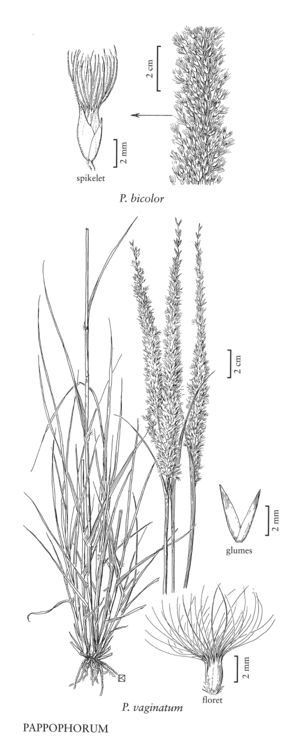| Taxon | Illustrator ⠉ | |
|---|---|---|
 | Pappophorum bicolor Pappophorum vaginatum | Karen Klitz Linda A. Vorobik Karen Klitz Linda A. Vorobik |
Plants perennial; cespitose, essentially glabrous throughout. Culms 30-130 cm. Sheaths open; ligules of hairs; microhairs of blades with an inflated terminal cell similar in length to the basal-cell. Inflorescences terminal, narrow, spikelike or somewhat open panicles; disarticulation above the glumes but not between the florets, these falling together. Spikelets with 3-5 florets, only the lower 1-3 bisexual. Glumes subequal, thin, membranous, 1-veined, acute; lemmas rounded on the back, hairy at least basally, obscurely (5) 7 (9) -veined, veins extending into scabridulous awns of unequal length, several additional narrow awnlike lobes usually also present, awns and lobes together forming a pappuslike crown; paleas textured like the lemmas, 2-veined, 2-keeled, keels scabrous or hairy; anthers 3; styles 2. Caryopses elliptical, plump, slightly dorsally flattened or nearly terete; embryos about 1/2 as long as the caryopses. x = 10.
Distribution
Maine, N.Mex., Tex., Puerto Rico, Virgin Islands, N.Y., Ariz.
Discussion
Pappophorum is an American genus with about eight species. It grows in warm regions of North and South America. Two species are native to the Flora region.
Selected References
Lower Taxa
Key
| 1 | Panicles purple-tinged, narrow, but usually with some slightly spreading branches; lemma bodies 3-4 mm, the awns mostly not more than 1.5 times as long, these rarely spreading at right angles | Pappophorum bicolor |
| 1 | Panicles white or tawny, rarely slightly purplish, tightly contracted; lemma bodies 3-3.2 mm, the awns about twice as long, commonly spreading at right angles when mature | Pappophorum vaginatum |
"scabridulous" is not a number."decumbent" is not a number.